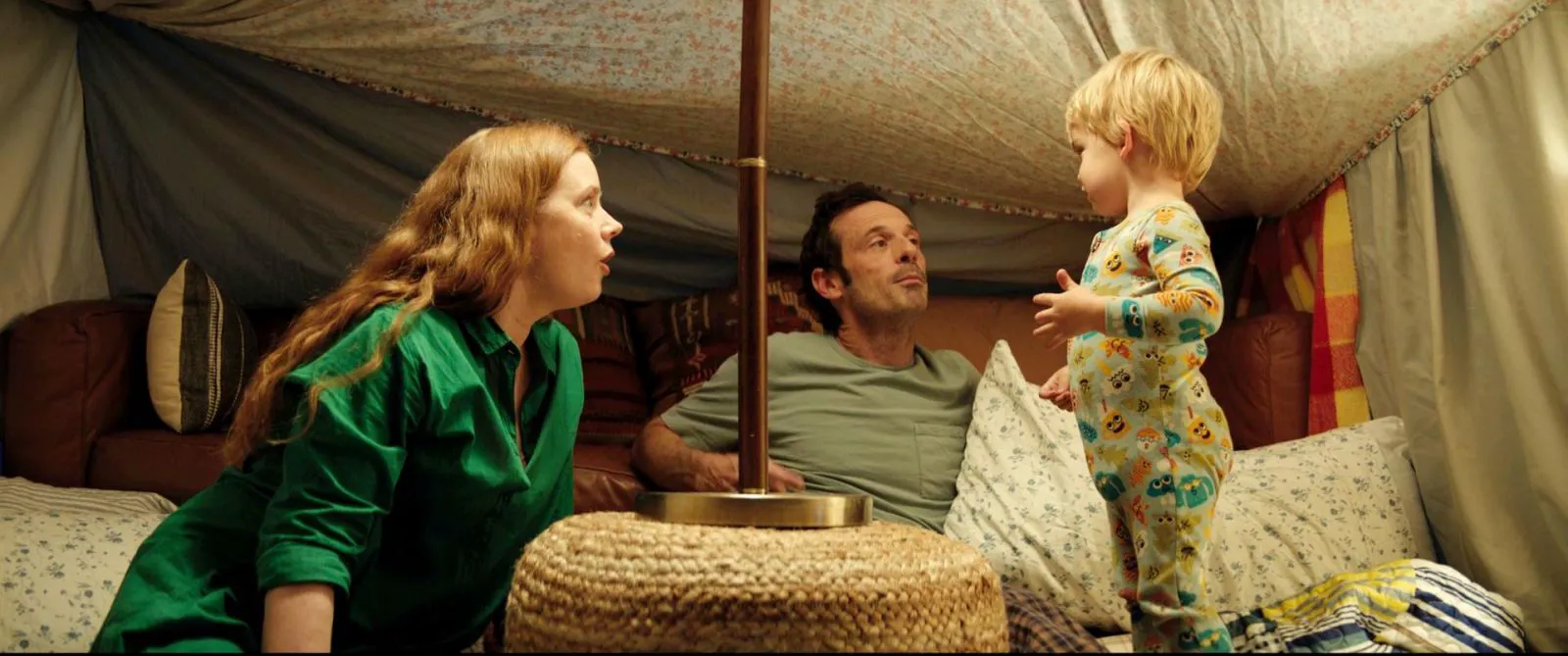“Nightbitch”: When Motherhood Gets a Little… Wild
The word “mother” carries a sacred weight for many. Yet, society often glosses over the realities of motherhood, reducing it to mere obligation (“she should,” “it’s expected”). Complaints of physical and mental exhaustion are often met with dismissals like, “No one forced you to have kids.” “Nightbitch,” based on Rachel Yoder’s novel of the same name, could be seen as a less extreme cousin to “Substance.” Both explore radical bodily transformations and satirize imposed societal standards. The film invites us to howl, to unleash the raw, internal pain, the injustice, the sheer exhaustion of the parental burden.

Amy Adams as Mother in “Nightbitch”
The Transformation Begins
At the heart of the story is Mother (Amy Adams), a middle-aged woman who recently gave birth to her first son. She has no name of her own; once a successful artist, she moved to the suburbs after her pregnancy, dedicating herself entirely to family duties and the daily grind. Her husband (Scoot McNairy) is constantly traveling for work and, even during rare moments of family time, bombards Mother with mundane household issues. Suddenly, her senses sharpen – smell, sight, and other primal instincts intensify. Fur sprouts, a tail emerges, and she develops an insatiable craving for meat and a hostile attitude towards the family cat. The woman begins to feel like a dog, completely re-evaluating her position and the hallowed status of motherhood.

Amy Adams as Mother in “Nightbitch”
A Director’s Touch
Directed by Marielle Heller, a prominent indie filmmaker of the 2010s known for exploring different facets of the female experience – from adolescence (“The Diary of a Teenage Girl”) to midlife crisis (“Can You Ever Forgive Me?”) – “Nightbitch,” despite its fantastical premise, is surprisingly straightforward, making it accessible to a wider audience. Unlike the source material, the film is more restrained, softening some of the more potentially controversial elements for modern viewers. “Nightbitch” resonates through Mother’s internal monologues, delivered with varying degrees of ferocity. “Don’t you think we’re gods?” Mother asks her fellow “sufferers.” Each of them carries a new life within, bone and flesh, but society, like their oblivious husbands, remains indifferent. Women are reduced to functions, and Mother resists this by embracing a magical transformation, trotting towards her true, natural calling – the freedom that the world has brazenly and presumptuously claimed for itself.

Amy Adams as Mother in “Nightbitch”
Amy Adams’s Bold Performance
Fans of Amy Adams have been eagerly awaiting a role that truly showcases her talent after a string of less successful projects. “Nightbitch” delivers, easily securing a spot among the actress’s most daring and monumental performances. The six-time Oscar nominee’s greatest weapon remains her eyes. Adams throws herself into the role emotionally and physically, resorting to demonic quad-walking, delivering manifestos, and alternating them with shockingly funny lines (“I can crack nuts with my vagina”). But at its core is a boundless empathy for her character, an understanding of her disillusionment with her new life and the need to move forward. “Where’s the wife who used to inspire me?” laments her bewildered husband. “She died when our son was born,” Mother retorts, rebuking both her husband and the world for failing to recognize her struggles.
A Blend of Absurdity and Empathy
“Nightbitch” could easily have become another unhinged social horror film, but Heller is more interested in empathizing with the human experience. She chooses a path of less resistance and a more “vegetarian” approach (both stylistically and thematically). Mother spiritually resurrects, returns to her beloved art, and begins to share family responsibilities with her husband, taking into account her own needs and desires. The film advocates for open communication about conflicting emotions and seemingly hopeless situations, making “Nightbitch” a prime example of quality cinema where didacticism successfully coexists with absurdity.